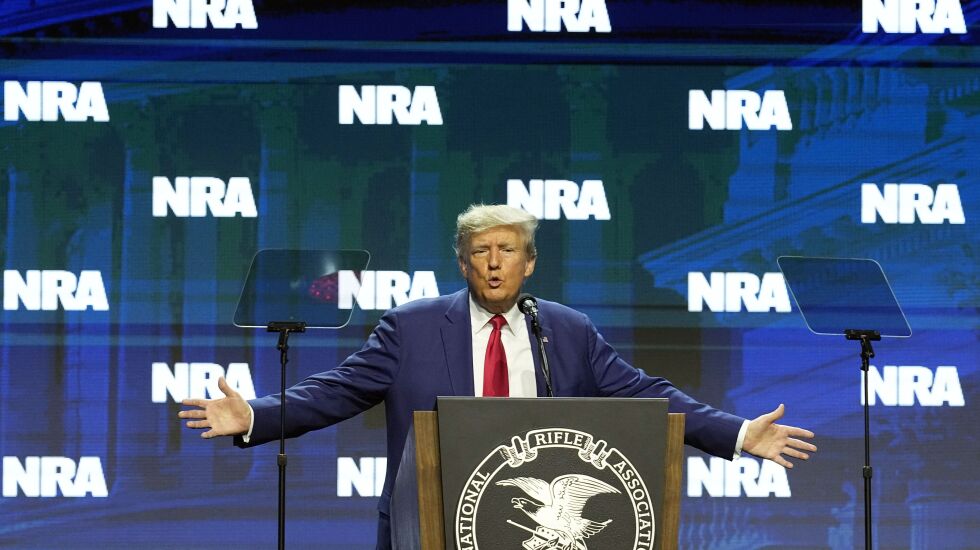
My wife has a strategy I call “The Thinking Trick,” a last resort when we’ve lost something. Like yesterday; I wanted my AirPods to make a phone call, but they weren’t in the usual places — desk, night table, dresser, various pockets. I was at the point where I start madly racing around, yanking open drawers, when I stopped cold, and remembered the trick.
When did I last use them? I asked myself. Immediately the answer came: the night before. A call from my cousin. Sprawled on the sofa. I went into the living room. The sleek little white AirPods case lozenge was on the coffee table, right where I left it.
The Thinking Trick is also useful in situations that involve not lost objects, but lost reason. For instance, the former president, Donald Trump, spent a long time at the NRA Convention last weekend in Indianapolis airing the notion that a good way to stop school shootings is by arming teachers.
“They’d go for special training and they would be there and you would no longer have a gun-free zone,” the former president said. “Gun-free zone to a maniac — because they’re all cowards, a gun-free zone is: ‘Let’s go in and let’s attack, because bullets aren’t coming back at us.’”
So school shootings are the schools’ fault? For inviting shooters in, by not having a gun in every teacher’s drawer? Ooooo-kay.
Trump went on, crediting guns in airplane cockpits as the reason hijackings faded away. (Me, I suspect the full-body security scans of passengers to make sure they aren’t armed with so much as a nail clipper might have had something to do with it. Using his school logic, disarming airline passengers is just asking for trouble.)
But that’s the problem with thinking, as attempted by some. They keep tripping over their unexamined assumptions, like the former president’s theory that kids who shoot up schools rationally weigh their options first.
So let’s do our own thinking. Let’s say we take the former president’s advice, and many teachers are now armed. Apply my wife’s patented Thinking Trick. What would happen?
Well, some school shootings might be thwarted. It’s possible that the next kid who whips an AR-15 out of his gym bag and starts blazing away might be himself gunned down — that’s the cherished fantasy — even though the armed cops and guards at previous school shootings tend to be in a different part of the school or using the restroom or too afraid to act or shoot and miss. Generally useless, since life ain’t the movies.
What else might happen?
America has seen four shootings this week, at least, of people who knocked on the wrong door, or drove into the wrong driveway, or got in the wrong car. Gun accidents would soar.
Here we need to remember a salient fact. School shootings, while traumatic and widely publicized, are also very rare. Over the past five years, slightly over a thousand people have been shot and killed at schools in this country, according to the K-12 School Shooting Database.
That’s a staggering tragedy. Shocking, until you consider the number of Americans who were killed by guns, generally, in that same period: over 200,000.
Most are suicides. Considering that fact, let’s continue to ponder: What would happen if society decided to put guns in the hands of teachers? Answer: suicides would soar. Accidents, too. Then add to that the students who get access to the teacher’s gun and kill themselves or others.
My guess would be, generally, arming teachers would mean that for every school shooting death avoided, there would be 50 to 100 more suicide deaths, accidental deaths and other unnecessary loss of life.
We don’t need laws. We need education. Suicide is common; getting the drop on the bad guy, rare. The suicide rate of teachers is very low: 7.5 per 100,000 (lowest among the 22 professions the Centers for Disease Control and Prevention tracks). The suicide rate among farmers is 10 times as high.
Why? Is farming that bad? No, in part it’s because gun ownership among farmers is double that of teachers. As Homer said: “The blade calls to acts of violence.” Guns are an invitation to kill yourself, and pressing them indiscriminately on teachers worsens an enormous and common problem while doing little to avoid a disturbing but rare one.







